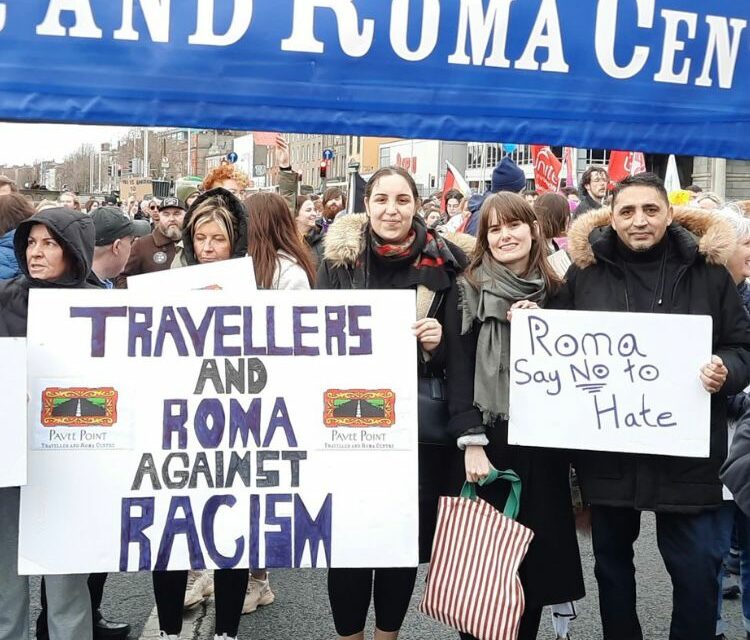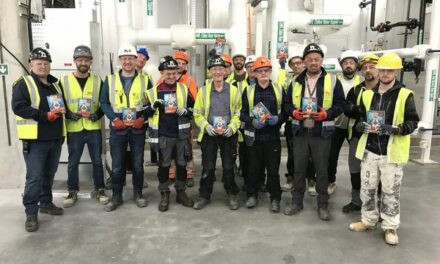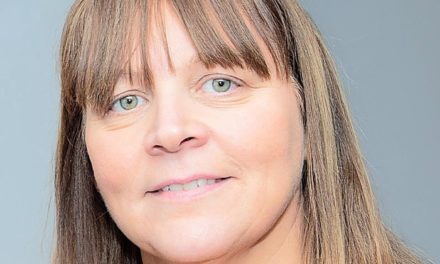“There’s definitely a question around women from ethnic minority communities’ experiences of the maternity services.” – Jenny Liston, Pavee Point
A quarter of Roma women’s first contact with maternity services is when they arrive in labour at the hospital. Without translators available, patients and medics rely on Google Translate to communicate. We wouldn’t know about this if it wasn’t for the tremendous work being done with Roma people by Pavee Point.
The seven-strong Roma Programme team in Pavee Point has expanded in recent years, and works across the areas of health, employment and inclusion, as well as celebrating Roma history and culture.
In 2018, Pavee Point worked on the National Roma Needs Assessment, which remains the only national piece of research looking at the needs of the Roma community.
The research highlighted the disadvantages faced by Roma in Ireland. It includes some sobering statistics – 20 per cent of the community here live in poverty.
Another shocking statistic was the fact that a quarter of Roma women’s first contact with maternity services is when they arrive at hospital in labour.
Unfortunately, it seems little has changed since 2018.
During EU Roma Week in April, the HSE’s National Social Inclusion Office and Pavee Point launched ‘Roma Daja’, the first targeted maternal health information resource for Roma women.
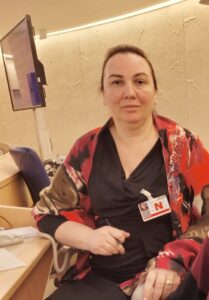
– Gabi Muntean, community worker with Pavee Point’s Roma Programme
Gabi Muntean, Community Development Worker with Pavee Point, who is Roma herself, told Changing Ireland: “Nothing really changed from 2018 to 2023. Women still don’t go to see the doctor before they give birth.
“I gave birth 27 years ago in Romania. But what I heard from the girls that I spoke with, it’s not much different (in Ireland today). They were not speaking very nice with me, they were not treating me nice. In Ireland, it seems that the experience is the same. You can see the difference between being Roma in a room full of women that are non-Roma. So everywhere I would say, racism exists, and discrimination, and people are not changing.”
To coincide with the launch of the information booklet, Pavee Point launched a new report on Roma maternal health.
Jenny Liston, programme coordinator of Pavee Point’s Roma Programme said: “The maternal health issues that came up shocked everybody. We wanted to try and dig a little deeper into why is that happening for Roma women.”
Jenny said the report, entitled ‘Romneango Sfato/Roma Women’s Voices’ “is an important step in highlighting the health inequalities experienced by Roma women in Ireland”.
“We released the research on the same day to say: ‘Yes, Roma women need more information. But the services also need to know what Roma women are saying because it’s a two-way process’.
“In terms of how their pain and their medical needs are treated and taken seriously, we’ve seen – not just in our research – that migrant women’s experience of maternity services is very similar around unmet medical needs, women being more at risk of something going wrong.
“There’s definitely a question around women from ethnic minority communities’ experiences of the maternity services, particularly for Roma women. Lots of women talked about not having access to an interpreter, not understanding what’s happening if there’s a health issue or medical emergency, or relying wholly on Google Translate.
“Bianca, who’s on our team, is in her early 20s and has had one baby. The nurse said to her: ‘Oh you’re Roma, we’ll see you very soon again so’. This kind of presumption that you’re a Roma woman, you’re just going to keep having babies. She said that she felt humiliated.”
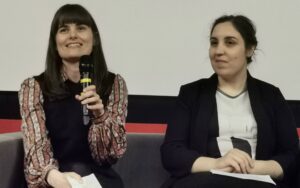
– Jenny Liston and Bianca Tanase of the Pavee Point Roma Programme at the launch of their report on maternity services in April
FORCED STERILISATION
Pavee Point believes that there is a need for health professionals to have a better understanding of the history of the Roma community.
“It’s not that long ago, right up until the early 2000s, that there were cases in Slovakia of forced sterilisation of Roma women.
“500,000 Roma were murdered during the Holocaust, and a lot of the Roma families that were brought to concentration camps were medically experimented on. So the views of doctors and trusting those in power is not a natural fit for the Roma community,” explained Jenny.
UKRAINIAN ROMA
An unexpected challenge that arose last year was the need for targeted supports and an understanding of challenges specific to refugees from the Ukrainian Roma community.
“Ukrainian Roma are facing additional barriers in getting across the borders and getting the same access to aid. We knew that this was an issue coming down the track. We’ve set up a phone line now, specifically for Ukrainian Roma when they need support,” said Jenny.
“A lot of families were initially refused temporary protection when they came. It’s still going on. One of the reasons they would be refused would be based on lack of evidence of being in Ukraine at the time of the war, even if they have Ukrainian passports.
“A lot of the Roma families might not have any English or literacy. They also mightn’t have things that may be expected by immigration like bank accounts, or formal documentation.
“We came across discriminatory behaviour, and a lack of understanding that you can be Roma and Ukrainian. Also there would be a lot of Ukrainian support staff who might have their own views as well around the Roma community.”
Pavee Point Roma Programme staff have since carried out work with immigration staff, interpreters and various organisations working with Ukrainians “just trying to raise awareness that there are Ukrainian Roma”.
Some 200 Ukrainian Roma have so far accessed the helpline, however Pavee Point estimates there they may be up to 500 Ukrainian Roma currently living in Ireland.
CHILDREN FORCED TO SLEEP ON STREET
Jenny revealed: “We had a case recently where a family were evicted from the hotel that they were assigned because they didn’t pay their food bill. They (Ukrainian refugees) now have to pay for food out of their social welfare.
“They came out to City West where nobody would speak with them, and they ended up sleeping out the first night, their three children with them. Then someone told them about us.
“They rang us and we realised that the family didn’t have a social welfare payment – that’s why they didn’t pay for the food. They couldn’t fill in the forms, and nobody had supported them to fill in the forms.”
COMMUNITY DEVELOPMENT APPROACH
“We’re always responding to what we see in the community. Like the rest of Pavee Point, we use the community development approach, and we’re focused on collective action and promoting the rights of the Roma community and we do this through working directly with the community, but also policy development and working with service providers, with the State in terms of how to address racism and discrimination that the Roma community face in Ireland,” noted Jenny.
NO SAFETY NET
Pavee Point has done much campaigning around the impact of the habitual residence condition on the Roma community, which means that many cannot access social welfare and housing supports.
Jenny commented: “About half of Roma who had applied for social welfare weren’t successful. This leaves the community without a safety net and excludes families from the basics like child benefit. This is the main issue that excludes the Roma community from a lot of support. People are living on the margins a lot of the time.”
Gabi added: “I was thinking after the Needs Assessment in 2018 something will change. There have been some changes, but, for example, parents still cannot have the child benefit because the parents are not habitual residents. The poverty was and is still really huge in the Roma community.”
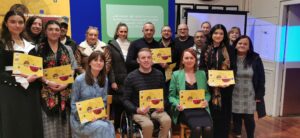
Pavee Point staff and researchers from Maynooth University at the launch of the report on employment in the Roma community in February
HIDING THEIR IDENTITY
New research on employment among the Roma community undertaken by Pavee Point in collaboration with Maynooth University was published in February.
For the research, 23 people from the Roma community were interviewed about their experiences and it showed they face significant inequality in the workplace.
“It came out really strongly that Roma people felt they had to hide their ethnicity when looking for work because they just feel that they will not get a job. A lot of Roma women said they wouldn’t wear their traditional clothes if they were looking for work,” explained Jenny.
FRIGHTENING RISE IN RACISM
Like many organisations working with migrant communities, Pavee Point has noticed a worrying rise in the influence of far-right anti-migrant sentiments, particularly online.
Jenny said: “When we launched the employment research, it was well attended and it was a really positive event. But the comments below on every social media of these positive events – it’s desperate to see the racism that can follow something like that. So you can see how it’s difficult for people to put themselves out there and identify as being Roma. We’re all seeing the rise of that far-right rhetoric, not just anti-Roma racism but also anti-migrant. It’s scary, it really is.”

